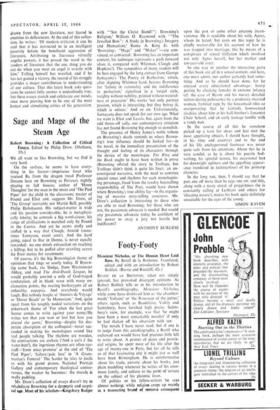Footy-Footy
Monsieur Nicholas, or The Human Heart Laid Bare. By Restif de la Bretonne. Translated, edited and with an introduction by Robert Baldick. (Barrie and Rockliff, 42s.) RESTIF DE LA BRETONNE, when not simply ignored, has provoked divergent opinions. As Robert Baldick tells us in his introduction to Restif's autobiography, Monsieur Nicholas, while some have dismissed him as 'the chamber- maids' Voltaire' or 'the Rousseau of the gutter,' others again, such as Baudelaire, Valery and Saintsbury, have lavished high praise. Saints- bury's view, for example, was that 'he might have been a most remarkable novelist' if only he had shaken off his obsession with sex.
The novels I have never read; but if one is to judge from this autobiography, a Restif who eschewed sex would have had precious little left to write about. A printer of pious and provin- cial origins, he spent most of his life after the age of twenty-one in Paris, but for all he tells us of that fascinating city it might just as well have been Birmingham. He is uninformative about his trade, cursory about his books, just plain muddling whenever he writes of his enor- mous family, and tedious to the point of torture on the subject of his platonic loves.
Of politics or his fellow-writers he says almost nothing; while religion crops up mainly as a nauseating brand of remorse consequent upon the pox or some other amatory incon- venience. He is readable about his wife, Agnes,
whom he hated; but even on this topic he is chiefly memorable for his account of how he was trapped into marriage, this by means of a conspiracy of sexual titillation which involved
not only Agnes herself, but her mother and ten-year-old sister.
So one way or another the interesting parts of this book are all in a sexual context, and here, one must admit, our author certainly had some- thing. And so he should have done, for he enjoyed every educational advantage: heavy petting by clucking females in extreme infancy (cf. the case of Byron and his nurse), detailed tuition during pubescence by a predatory married woman, frenzied rape by the housemaid (this so overpowering that he fainted), homosexual rivalries about him at his half-brother's Jansenist Choir School, and an early teenage tumble with a randy nun.
In the course of all this he somehow
picked up a taste for shoes and feet (not the most appetising objects, I should have thought, in his time and country) and to the end of his life unchaperoned footwear was never quite safe from his attentions. About this he is very candid, as he is about his puerile bed- wetting, his spiteful nature, his occasional lust for downright ugliness and the appalling appear- ance (rendered in technicolour) of his primary chancres.
In the long run, then, I should say that he
puts one off more than he eggs one on; and this, along with a nasty streak of priggishness (he is constantly railing at Lesbians and others for `cheating nature'), makes his book quite definitely unsuitable for the eyes of the young.
SIMON RAVEN


































 Previous page
Previous page